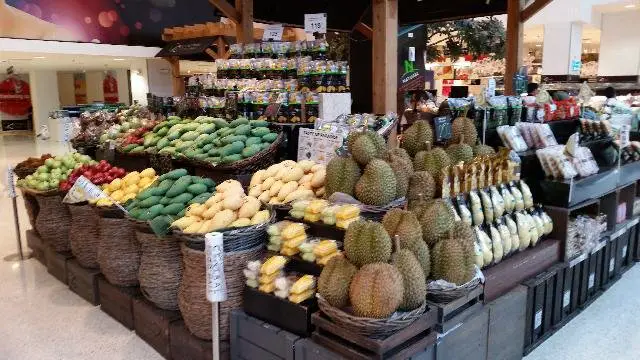Last Updated on August 6, 2023 By Emma W. Thomas
Whole Foods can be expensive due to various factors, including high-quality organic and natural products, ethical sourcing, and sustainable practices. Additionally, operating costs, premium offerings, and limited sales or discounts contribute to the higher prices.
Why Are Whole Foods So Expensive?
1. Premium Quality of Products
Whole Foods is renowned for its high-quality products which add to the cost. They offer organic, non-GMO, and free-range products which are extensively vetted to meet stringent health and safety standards. These superior-quality goods are generally pricier than conventional products due to the cost-intensive farming techniques used.
2. Environmentally Friendly Practices
Whole Foods is committed to maintaining sustainable and eco-friendly business practices. This includes factors such as fair-trade policies, detailed animal welfare standards, and promotion of environmentally-friendly farming practices. While this leads to a healthier planet and better products, it also accelerates costs.
3. Extensive Variety of Unusual Products
Whole Foods offers a wide array of specialty products you might not find in other stores. They possess an extensive range of vegan, gluten-free, and allergy-friendly options. The scarcity of these products and the difficulty in sourcing them directly contributes to their high price.
4. Store Experience
Shopping at Whole Foods is not just about purchasing groceries, it’s a complete experience. The stores often come with high-end decor, well-trained staff, and excellent customer service. They also provide amenities such as samples, salad bars, and on-site eateries. All these add to the operating expenses, which in turn makes the products more costly.
5. On-site Prepared Foods and Bakeries
Whole Foods has an extensive selection of prepared foods and boasts high-quality in-store bakeries. While these provide convenience and variety for the shoppers, they also require additional ingredients, staff, and equipment, leading to higher costs overall.
6. Business Model
Whole Foods’ business model inherently involves a higher cost structure than discount grocery chains. Factors such as smaller store formats, denser urban locations, and the absence of mass-market brands in favor of unique value propositions lead to greater expenses passed onto the consumer.
7. Perception of Value
The pricing at Whole Foods also has a psychological aspect. The high-quality environment, exceptional customer service, and superior product quality all contribute to a perception of value that customers associate with the brand. This perception often allows Whole Foods to demand a higher price for its products.
| Reasons for Expensive Whole Foods | Explanation |
|---|---|
| Premium Quality of Products | High standards result in cost-intensive production and sourcing |
| Environmentally Friendly Practices | Sustainable businesses practices add to the cost |
| Unusual Variety | Scarcity and difficulty in sourcing drive up the price |
| Store Experience | High-end services and decor add to operating expenses |
| On-site Prepared Foods and Bakeries | High cost of additional ingredients, staff, and equipment |
| Business Model | Higher cost structure than discount grocery stores |
| Perception of Value | Superior quality and services contribute to a higher perceived value |
What Is So Special About Whole Foods?
Most of the foods that we get from the supermarket, including vegetables, fruits, and grains, are produced on a large scale. Hence, the target for production mostly focuses on quantity. The foods are refined and processed using various chemical substances, which compromises the foods’ nutritional value.
The very basic concept of whole foods stands apart from processed foods by keeping the quality over the quantity. Instead of mass production, whole foods are carefully produced in organic farms, which ensures their higher quality. Whole foods are unprocessed or keep the processing as low as possible to keep their nutrients intact. They are produced using better quality materials, which increases their cost.

Is The Whole Foods Healthy?
Most of us rely on processed foods. We need a quick fix in our daily lives. This results in us often forgetting about nutrition. Most processed foods contain much oil and sugar, which are responsible for several life-threatening diseases. Unhealthy eating habits also increase the chance of obesity in people. The increasing rate of heart diseases with several others like hypertension, diabetes, and cancer points towards unhealthy eating habits and lifestyles.
According to the market, processed foods are cheaper and easier to make than organically grown whole foods. They may be expensive, but they are rich in nutrients and help to counter many of the diseases.
Whole foods contain vital nutrients and vitamin that improves our overall health. Studies have shown that a whole-food diet can help to reduce weight. We can work towards a healthy lifestyle while keeping our weight in check.
Heart diseases are a threat when it comes to our well-being. That is why the quality of our diet matters. Studies have found that people who have maintained a whole-food-based diet have a significantly less chance of developing heart disease. To maintain a healthy heart, plant-based whole foods are the best choice.
Whole foods can also help reduce the risk of cancer. People who have a plant-based diet are less likely to develop gastrointestinal cancer.
A whole food diet that is plant-based can help to regulate your blood sugar. Keeping sugar levels low can lead to a lesser chance of developing diabetes. The risk is higher in people who prefer a non-vegetarian diet.
In addition, whole foods can also improve memory and reduce the chances of having Alzheimer’s disease. They prove effective in bettering one’s cognitive capability and helping to resist diseases like dementia. Whole foods are rich in antioxidants, which can counter the process of aging and result in a longer life span.
Are Whole Foods Worth It?
Most of the food that we buy from the market is highly processed and mass-produced. Hence, they are cheaper than plant-based whole foods. Eating more processed food can lead to poor health and cause a number of diseases over the years. The cure for some of these diseases is fairly expensive, and for others, there is no cure at all. Some of the diseases and symptoms are chronic, so they need constant medical attention throughout life.
The habit of eating processed food can prove to be expensive in the long run. Plant-based whole foods are costlier than processed foods, still, they come with plenty of vital nutrients and vitamins. The nutritional value of the foods resists these diseases by improving our immunity. To keep a healthy, functioning body and a long life, whole foods are worth their cost.

How Expensive Are Whole Foods?
Whole foods are priced significantly higher than substitutes. The fruits and vegetables are taken great care of; thus, the yield is of higher quality. Most of the whole foods’ price is around 10%-20% higher than other foods, making it expensive.
List Of Whole Foods
Some of the whole foods are listed below:
- Unrefined grains – whole wheat, brown rice, barley, etc.
- Vegetables – kale, spinach, sweet potato, carrot, cauliflower, tomato, broccoli, etc.
- Fruits – apple, banana, apricot, pineapple, avocado, peach, and other citrus fruits.
- Seeds – sesame, pumpkin, flax, quinoa, hemp, sunflower, etc.
- Legumes – black beans, chickpeas, fava beans, kidney beans, lentils, etc.
- Nuts – walnut, almond, cashew, pistachio, hazelnut, etc.
Oils, refined sugar, and white flour are not taken into account because of the processing they go through. For some animal and dairy products, if they’re unprocessed, then they are considered whole. As an example, it is true for cow milk. If the milk does not go through the process of fat removal, it is considered whole by some specialists. The same thing goes for seafood and fish.
Comparison Between Whole Foods And Processed Foods
| Whole Foods | Processed Foods |
| Whole foods are expensive compared to refined foods. | Processed foods are cheaper than whole foods. |
| Whole foods are cultivated carefully without any chemical fertilizers and pesticides. | Processed foods are mass-produced hence, chemical pesticides and fertilizers are used. |
| The absence of chemicals ensures the foods’ higher nutritional value. | Processing of the foods cuts down to their nutritional value. |
A whole foods diet ensures a healthy lifestyle, whereas eating processed foods can lead to several serious threatening diseases. In this way, whole foods remain a healthier substitute than refined foods in spite of their high price.
Conclusion
To summarise the article, a few points can be made about whole foods. Whole foods are expensive for their production process, but they provide better nutritional value than other cheap, processed food substitutes. Consuming whole foods also comes with great health benefits. As expensive as they may be, they are worth the cost.
References:
https://thegrocerystoreguy.com/why-is-whole-foods-more-expensive/
https://www.thedailymeal.com/1294421/whole-foods-still-most-expensive-grocery-store/
Emma is a graduate of Domestic Science or Family and Consumer Sciences (Home Economics) from the University of Wisconsin. She has 7 years of experience Working with the strategic section of BestBuy and now writing full-time for Homeeon.
From Managing the Home, Interiors, Cleaning, and Exteriors to Gardening and everything about Making A Home Liveable – is her passion and this Homeeon is the result of this.
Emma loves decorating her home with the best stuff found online. She cares about quality over anything and writes reviews about them here in Homeeon. Get in touch with her over Pinterest.
Keep reading her blogs.
